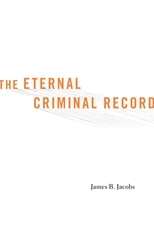The Volokh Conspiracy
Mostly law professors | Sometimes contrarian | Often libertarian | Always independent
Is employment discrimination against ex-offenders immoral?

The Eternal Criminal Record is a wide-ranging examination of jurisprudential, policy and empirical issues surrounding the construction, dissemination and use of criminal records, including intelligence information, arrests, convictions and court records. While there is much in the book about the use of criminal records in criminal justice system decision making, in my blogs for The Volokh Conspiracy I will concentrate on the morality, legality and remedial proposals regarding criminal record based employment discrimination (CBED).
Today, I will talk generally about CBED. Tomorrow I will deal with Title VII's disparate impact doctrine as it applies to CBED. On Wednesday I will deal with the EEOC's Enforcement Guidance on the Use of Arrests and Convictions in Employment. On Thursday my topic will be state laws and proposals for restricting CBED. On Friday, I will turn to the Ban the Box Movement.
A rational employer wants the best qualified and motivated workforce at a particular price, not a minimally qualified workforce. While an employer may be hiring for a particular job, it cannot be faulted for aiming to hire individuals who can move into other positions if and as needed and to be promotable in due course. Therefore, the job applicant's honesty, reliability and self discipline will practically always be relevant, indeed extremely important. Likewise, the relevance of a particular conviction to a particular position will often be beside the point.
It is not immoral for businesses, not-for-profits, volunteer organizations and individuals to commission criminal background checks on those they are considering employing, admitting to membership or dating. More information is almost always preferable to less information. Failure to search out, or inattention to, such information might later be the basis for civil liability.
Dishonest, unreliable and un-self-disciplined employees impose costs on a business. Employers must internalize the costs of accidents, thefts, sabotage, absenteeism and workplace violence. Employers are liable for damages caused by employees who harm customers, clients and colleagues. In some states, employers also face liability if the person injured by an employee with a criminal record can prove that the employer's hiring decision was negligent.
Given the modest cost of criminal background checking to hire, the cautious employer will require checks on all new hires. In one survey, 92 percent of responding employers stated that they required criminal background checks for some or all jobs. Their reasons included preventing theft, and workplace violence and avoiding liability for injuries and damages. Ex-offenders do not always reoffend, but they often do. Character is not a chimera.
Public policy strongly opposes criminal conduct. Punishing and deterring criminal conduct is necessary for public order and smoothly-functioning community. Government has a legitimate interest in protecting the public from criminal threats. Criminals should be condemned and crime deterred. It is telling that government itself not only condemns and punishes criminal conduct, pervasively discriminates against persons with criminal records in hiring and occupational licensing (collateral consequences of conviction). It would be inconsistent and hypocritical to compel businesses, volunteer organizations, colleges and universities to ignore individual criminal history.
Government and society generally have a strong interest in promoting ex-offender employment. Legitimate employment doesn't assure desistance from crime, but it is a crucial factor if not a necessary precondition. However, it is one thing to recognize this interest and another thing to say that private employers must subordinate their own organizational and financial interests by adopting a pro-ex-offender employment policy.
It is well to remember that, while ex-offenders need jobs, so too do people who have never been convicted. When an ex-offender is passed over for a job, that job does not disappear. It is filled by someone who may be equally or more needy.
There is also a clear public interest in supporting employment of non-ex-offenders who need jobs. Job seekers with a spotless criminal record would have a valid complaint against a public policy that compelled private employers to treat a job applicant's criminal; record as irrelevant. Such a policy might undermine a person's commitment to obeying the law. Indeed, it could be persuasively argued that public policy should favor treating a clean criminal record as a plus factor for public and private hiring, a kind of benefit to reward and encourage good citizenship.


Show Comments (0)